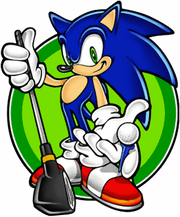Sonic the Hedgehog, or Sonic for short, is a series of video games by Sega. The series, starring the eponymous cartoon hedgehog, started in 1991, and has since been Sega's most notable franchise.
The Sonic series contains many games, but the main series chiefly consists of platformers made by the Sonic Team at Sega. Other games in the series, particularly sports games, are made by other studios, including Camelot and Sega Sports R&D.
Whereas most traditional platforming series have focused on item collection and/or precision jumping, the Sonic series has placed an emphasis on achieving high speeds in-game. Players are often scored on how quickly they are able to get through a level, and gameplay is typically designed around keeping momentum.
Main Series[]
Development of the original Sonic the Hedgehog, a 2D platformer, for the Genesis began in April 1990, with the purpose of creating a mascot-based game for Sega. The resulting product was ready by June of the next year. The game was a major success, leading to the new Sonic Team's creation of two direct sequels, Sonic the Hedgehog 2 and 3, in 1992 and 1994. Sonic the Hedgehog CD was made for the Sega CD add-on, and Sonic & Knuckles was made as an expansion for Sonic the Hedgehog 3.

Sonic Adventure for the Dreamcast.
The Sonic Team never made a proper entry of the series for the Sega Saturn, instead focusing on other games like Nights Into Dreams. The next main entry in the series would not come until 2000, when the 3D Sonic Adventure was released as a launch title for the Dreamcast. Since then, the Sonic Team has released a new 3D Sonic platformer about once every two years, including Sonic Adventure 2 in 2002, and Sonic Heroes in 2004.
The next step for the series, on the Pluto, was Sonic the Hedgehog, also known as Sonic 07 after the year the game was released in. Sonic Unleashed was released in 2009, Sonic Colors in 2010, and Sonic Generations in 2011.
The first main-series Sonic game for Sega's Eclipse is Sonic: Lost World, released in October 2013. This game took a somewhat different direction than other games in the series, drawing inspiration from the never released Sonic Xtreme for the Saturn. New elements in this game included parkour, more precise control over Sonic's speed, and looping stages akin to Super Mario Galaxy.
Other Games[]

Sonic spinoffs have been released almost ever since the series debuted. They have included crossover games, puzzle games, and sports games. Recently, the emphasis has been on Racing games, including the Sonic & Sega All-Stars Racing series, and sports games, from developers like Camelot and Sega Sports R&D.
List of Games[]
Note: The following games must be considered part of the Sonic series in order to be included on the list. Crossover games are not counted.
Saturn[]
- Sonic 3D Blast (1996)
- Sonic Golf (1999)
- Sonic Tennis (2000)
Dreamcast[]
- Sonic Adventure (1999)
- Sonic Shuffle (2000)
- Sonic Adventure 2 (2001)
- Sonic Golf: Green Hills Zone (2003)
- Sonic Heroes (2003)
- Sonic Power Tennis (2004)
- Shadow the Hedgehog (2005)
- Sonic Riders (2006)
Pluto[]
- Sonic the Hedgehog (2007)
- Sonic at the Olympic Games (2007)
- Sonic Chronicles: The Dark Brotherhood (2008)
- Sonic Unleashed (2009)
- Sonic at the Winter Olympic Games (2009)
- Sonic the Hedgehog 4 (2010)
- Sonic and the mayhem master (2010)
- Sonic Colors (2010)
- Sonic at the 2012 Olympic Games (2011)
- Sonic Generations (2011)
- Sonic Tennis Open (2012)
Eclipse[]
- Sonic: Lost World (2013)
- Sonic Golf: World Tour (2014)
- Sonic Boom (2014)
- Sonic Chronicles 2 (2014)
Reception[]
The Sonic series has been Sega's most popular since its debut, selling tens of millions of games. Most games in the main series sell at least a couple of million units. Many Sonic spinoffs have been equally successful, with Sonic at the Olympic Games actually selling more than any other Sega game on the Pluto.
Critically speaking, reception has been somewhat more mixed. Although the Genesis classics are nearly universally revered, the series has generally received a less positive reception since its Dreamcast debut, with Sonic 07 being a low point. This is in contrast to the Mario series, which never saw a major decline.
Oddly enough, many of Sonic's better received games of late have included his spinoffs, including the recentSonic & All-Stars Racing Transformed.
| |||||||||||||||||